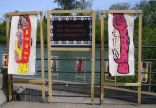Updated November 15. 2012
In good faith and with a permit from the Vatican in hand, the Thirteen Indigenous Grandmothers set up a prayer altar in St. Peter’s Square last week. Along with sacred symbols from the traditions of each of the grandmothers were two crosses, since some of the grandmothers are Catholic.
From my point of view, St. Peter’s was blessed with the presence of these elders. I cannot imagine a more hopeful model than that engendered by such a prayer gathering: perhaps it might even inspire others to work for social and environmental justice, as the grandmothers themselves do tirelessly.
I have stood by Grandmother Aggie, eighty six year old chair of this group, as she prayed. I know her humility-and her strength, both of which are grounded in her love for all the Creator’s work on this earth, of which humans are only one part. I can imagine the other grandmothers with their heads bent in reverence. As one who was raised Catholic, I want to thank them for bringing their devotion to the spiritual center of the Church.
But this was not the response of the Vatican police. As soon as the grandmothers began setting up, the police scurried out, claiming the women were conducting “anti-Catholic” demonstrations, and ordering them away. This leads me to wonder what kind of Catholicism they themselves held if it runs contrary to the work of these women for global justice.
I don’t think the police thought much about it. They were obviously acting out of impulse and fear. I imagine they assumed they were protecting something, but who or what that something was remains unclear. It was not the pope, who took an unplanned vacation after the grandmothers sent him notice they would be appearing at his scheduled public audience for that day to request he rescind the papal bull that “gave” indigenous lands and peoples to Christians in the fifteenth century–and was subsequently used as a license for genocide and slavery.
“He didn’t do it”, Grandmother Aggie is fond of saying. Therefore, she reasons, it wouldn’t hurt him to rescind this action–and it would do a lot of good.
Certainly, the pope might well entertain a plea to separate the Church from this shameful history. He might express the same kind of courage as did the Archdiocese of Seattle, which recently issued a public apology to the indigenous peoples of the Northwest for the harm missionary activity had brought to them and their lands.
Last week, however, the police continued to insist the grandmothers leave. But the grandmothers continued to stand their ground. Finally the police brought a law official to arbitrate: the latter listened to the grandmother’s songs and pronounced them non-threatening. This official not only okayed their permit, but invited the grandmothers into St. Peter’s Basilica to pray–and to rest, which Grandma Aggie, who is wheelchair bound, must certainly have needed at that point.
What is it about a particular kind of fervor (I would rather not call it “religious”) that caused the Vatican police to act with such hostility toward these gentle women who represent the best of the world’s spiritual traditions? Why did they not receive the grandmothers with open arms and gratitude for making their long journey from the ends of the earth–and honoring the Catholic Church with a dialogue about its integrity?
I myself believe that if the heart of God is large enough to include us all, that is a challenge for us humans to enlarge our own hearts in response. Fear, exclusion, and injustice does not protect anyone’s faith.
Here is a story about the experience of the Grandmothers at the Vatican published in Indian Country Today.
I can only imagine how differently Pope John Paul II might have received the Grandmothers in 1990- the year he wrote his encyclical “Peace with God the Creator, Peace with all of Creation” which emphasized the necessity of a “new solidarity” among all earth’s peoples and contained these words on ecology:
“An education in ecological responsibility is urgent: responsibility for oneself, for others, and for the earth..
The fruits of the earth are for the benefit of all. Today, the dramatic threat of ecological breakdown is teaching us the extent to which greed and selfishness– both individual and collective– are contrary to the order of creation, which is characterized by mutual interdependence.
Respect for life, and above all for the dignity of the human person, is the ultimate guiding norm for any sound economic, industrial or scientific progress. Each State should actively endeavour within its own territory to prevent destruction of the atmosphere and biosphere, by carefully monitoring, among other things, the impact of new technological or scientific advances. The State also has the responsibility of ensuring that its citizens are not exposed to dangerous pollutants or toxic wastes. The right to a safe environment is ever more insistently presented today as a right that must be included in an updated Charter of Human Rights.
Our very contact with nature has a deep restorative power. Even cities can have a beauty all their own, one that ought to motivate people to care for their surroundings. Good urban planning is an important part of environmental protection, and respect for the the natural contours of the land is an indispensable prerequisite for sound development.”
Filed under: Ecofeminism, Thirteen indigenous grandmothers, worldviews | Tagged: Agnes Baker Pilgrim, Ecofeminism, religion and dialogue, Thirteen indigenous grandmothers |






































I can understand the police’s initial reaction, though I don’t know if their continued insistence was necessary. Even if the Pope had expressed his appreciation of their religious freedom, I still feel it’s in a little bit of poor taste to conduct any kind of non-Catholic religious ceremony in St. Peter’s square. A Muslim might respect my freedom to be Catholic, but I would not go to Mecca to try and set up a Mass. Pragmatic things aside, it is disrespectful to the host, because performing a different kind of ceremony is, in some way, a rebuke of the host’s beliefs.
If these grandmothers were performing some kind of pagan ritual, even if it was for the benefit of the Church, it still seems a bit disrespectful to walk into what amounts to Catholics’ living room and do that. However, if they were given permission to do that, that changes things quite a bit. But I think it’s critical to remember how important St. Peter’s is to Catholics–it’s our home, and we often have guests, but just as we need to host them gracefully, we would hope that our invitation would not turn into a scandal or spectacle.
Thank you for sharing this comment on something you obviously care deeply about. I appreciate your sense of reverence and spiritual “home” here: the grandmother did have a permit. And since two of them are Catholic and brought Catholic crosses and prayers here, I’m not sure the term “pagan” ceremony exactly applies.
Just speaking for myself, I would like to avoid the labeling of anything as “pagan” with all the implications that go with it.
Secondly, you bring up an interesting point about holding to one’s own spiritual ground that solidly underscores the grandmothers’ petition for the Pope to rescind that old edict that all lands not occupied by Christians belonged to them by right of conquest. Not only did this license some terrible abuses (I can’t believe anyone who has read the journal of Columbus would want to celebrated Columbus Day, given the tortures he perpetrated on native peoples in order to enslave them to mine gold). It also invaded and violated the spiritual homes of those who are due respect every bit as much as we are.
In our globalizing world, I would like to see an ecumenical stance that both honors the unique spiritual ground of various religions and the common ground we share.
It is unfortunate that a leader like the Pope who has so much power (and the current one seems to be a dud) – does little to fix the damage that has been done. His influence is worldwide and stretches beyond any that an American President would ever have and yet it seems that instead of progress we see the Catholic Church continually taking steps back. Taking away rights of women and using the church as a disguise for male domination. By taking these steps back, they are pushing indigenous cultures further into despair and women further into submission. The world seems to have forgiven the Vatican for their misdeeds including the child abuse scandals- it would be nice to see the church reciprocate by taking action to make amends for their part in the taking of the indigenous lands and the mass murder of their people in the name of Christianity. As a Catholic, I am anxious to see changes in the church…if they ever come.
I agree, Anedra. It would have taken so little to withdraw this proclamation–and as the Grandma Aggie notes, HE didn’t make this proclamation, why should he have an investment in keeping it.
By contrast, the archdiocese of Seattle issued a public apology to indigenous peoples for the destructiveness of missionary activity. That seems like the right thing to do!
Thanks for your comment!
I, too am disappointed that the Pope didn’t take the opportunity to rectify the wrongdoing to the indigenous peoples done with the blessing of the church. It would have sent a clear message that the Church acknowledges their part and is remorseful.
I am completely taken aback by the behavior of the police toward the grandmothers. They had been granted permission by the Church and yet were still repeatedly interferred with. I am glad they stood their ground and won a sort of victory. At the very least, they were finally treated with honor (which should have happened from the start) and offered a place to pray and rest inside. It is a shame that they were not hosted with honor from the beginning. These women offer us great wisdom through their diverse life experiences, as well as the wisdom that has been passed down to them. I hope that their request will eventually be granted as it is one small action that can start many more.
I agree, Kathleen. Thanks for your comment. There is no reason not to begin the process of healing past tragedies.
It’s so interesting that the Vatican police found these little grandmothers so threatening. It’s amazing how one can lose sight of the big picture or even to ask the Grandmothers specifically what they were doing. I believe that this happens to us all in our day to day life as we become so consumed with our cause or focus that we forget to step back and remind ourselves of why we’re doing what we’re doing. This would have been a great way to begin some sort of healing for all the indigeneous people but instead just was another example of what we have become today.
I love your point about paying attention to what we are doing so that we can take the opportunity to heal the mistakes of our past, Jazmin. This is an opportunity we cannot afford to pass up!
Thanks Madronna! I do believe that it is possible to learn from our past and forgiveness is key. We can’t hold grudges in order to grow and make improvements in our world. I believe that the Grandmothers show this compassion of forgiveness and hope all in one. It’s amazing how wise someone can be. I can’t help but get goosebumps when I think about how much I believe in what they are trying to achieve and am so saddened with the struggles it takes to get there. BUT there is always hope and faith and this helps me get through the days. Yay! 🙂
Thank you, Jasmin. The grandmothers communicate the power of forgiveness even while they continue to express such strength. Be on the lookout for publicity regarding visits from Grandma Aggie if you live in the Willamette Valley– she comes through to speak fairly regularly.
I spend most of my weekends reading, and TRYING to catch up on homework (Lol). I just read the section on “Other Women Elders” and am amazed at the connections from there and here.
I agree 100% that there should be a recognition from the Catholic Church for past atrocities, and a public apology. The Maori had the right idea. That you, “…had to keep your eye forward on the lessons of the past in the present…” The church has a theology of forgivness, which to me means all can do wrong…even the church itself. It is a tad hypocritical to asks followers to acknowledge, repent, and “sin no more” but not take the lead yourself. I hope the Pope will have a change of heart.
I had a talk with a faith based leader who is a new partner with my work with homeless youth. He was doing a series adddressing societies “problems” with the church. One sermon was on “Is the church oppressive to women?” We talked a bit about what he would say, and I asked directly if he was going to acknowledge the church’s historical role in the oppression of women and minorities. I never got a 100% strait answer, of which I was disapointed. It would have been a hard stance for hime to make. But on the bright side for me, I am pleased men and women, faith and non-faith based, can come together and talk about these things today. It is at least on the table. I hope one day there is recognition for the mistakes the church has made, and those who have suffered for it, because if we can’t look the past in the eye, I’m afraid we’ll walk into the future just as blind.
You have a great point about forgiveness–which also means we should be able to forgive ourselves– and part of doing that is to make amends. I really appreciate the fact that the head of the Seattle archdiocese recently issued a public apology to indigenous peoples of the Northwest for the harms done to their culture by local missionary activities.
The Grandmothers represented something new and mysterious to these Vatican police officers, and evidently to the Pope too. Along with mystery often comes fear. I think these Catholic Church representatives were afraid of 1) their image being tainted in some way by these women 2) being forced to acknowledge their wrongdoings in the world now and in the past and/or 3) change.
It is very unfortunate that the Pope did not take this amazing opportunity to meet with these women and try to find common ground toward a better future.
You have a thoughtful analysis here, Dazzia. I do think that certain doctrines of the Catholic Church, like an unfortunate emphasis on dogmatic beliefs that arose in particular historical contexts, encouraged such fear. I can imagine what a wonderful opportunity this might have been to find common ground. That hopeful vision remains–after Grandma Aggie is still working and traveling the world for the sake of the generations to come, as I heard her say in a meeting with a small group of local women elders last night.
Growing up in both the Catholic and the Protestant churches (I was born from a mixed marriage), I will be the first to attest to the patriarchal mindset of the Christian religion. We have discussed in Madronna’s class the idea that many believe that there is fear at the heart of patriarchy. In my mind, this is why the Pope and the Vatican officials acted the way they did. If it is not something that they are familiar with, it could be threatening. While I harbor no ill will toward the Catholic church, I don’t think that it is a secret that the Church is not particularly apt at changing with the times. The events that happened in St. Peter’s square certainly should have gone better. The Grandmothers should have been received with open arms, as their mission was not one of hate but rather of love for the Earth and its people. But instead, ignorance ruled and their pleas went unheard. This is why Grandmother Aggie’s vision of seeing these mandates rescinded will probably never happen. The Church does not easily admit that it is wrong, just like any patriarchal organization or religion. This is a problem, especially now. Priests and nuns are in short supply (at least in North America) because our society seems to be turning away from the old idea of God and organized religion. The Church, in my opinion, is not helping itself by holding fast to old ideas (like the Papal bull you refer to). I love tradition and the comfort of stability, but when tradition and doctrine go against basic human rights, there is a serious issue.
Unless the Catholic church undergoes a rather severe shift in attitude and doctrine, I don’t see how it can sustain itself indefinitely in our current religious climate. That’s just my two cents.
I think your “two cents” is worth a good deal more, Amanda. Tradition which is doctrinaire loses its vitality–this is very different from the dynamic of indigenous tradition. Tradition only “works”, I think when it is life and vital. Indeed, this event in Vatican Square could have gone much better. But the good news is that the Grandmothers are still going strong–spreading love and hope and encouraging responsibility in terms of relationships to one another and the earth we share. And I take heart that the Seattle Archdiocese issued a public apology to local indigenous peoples for harm done by their Catholic missionaries a few years back. I think this is a true act of grace (just my own two cents, Amanda).
Isn’t that what we expect from a religious or holy place? That everyone will be taken in and met with open arms? Especially important leaders of other, peaceful, loving movements, and important elders and religious leaders from other lands and traditions! The catholic church could do much more for itself and the world by reaching out; by practicing the love it claims to believe in.
Eloquent response, Michele. Catholicism might certainly model what it means to attract if it fulfilled the vision you present here.
I have always found it interesting but extremely truthful that many want to ‘go green’ so to speak and have products that are nature friendly however, not everyone is willing to pay for what it takes to become earth friendly and safe. And as the article mentions that the value of something is determined on how much people are willing to pay, therefore it seems to be that humans are not willing to pay and do what it really takes to preserve and maintain our natural world. We have products in this world that have effected it tremendously such as plastic, killing and contaminating all living and natural things. It also discussed the contamination that genetically engineered crops have on those that are not genetically engineered. Just as the police overreacted to the Thirteen Indigenous Grandmothers, “…obviously acting out of impulse and fear.” This statement said so much in regards to those that claim to have the purpose of bettering the natural world with specific products but on the contrary it is causing more destruction. It is that exact impulse and fear that we tend to lose our focus and the main picture
I also grew up in the Catholic church, but couldn’t agree with their one single viewpoint ways as I got older. When I was in my 20’s I started to read books from authors such as Wayne Dwyer, Caroline Myss, and Deepak Chopra. I also went back and read different parts of the Bible. I started asking my local priests questions and he didn’t seem to like my questions. In the past I had looked at the philosophies of many other religious traditions and could no longer go with the idea that the Catholic view was the only reality or truth out there. I started broadening my scope and beliefs as time went on. I agree with the notion of the Catholic church having a patriarchal mindset. The fact that a woman cannot be a priest or leader in the church is a definate clue. The other indication of their patriarchal ways is the fact as their true and reality is the only one and everyone else who thinks differently is wrong. This article demonsrates the church’s inability to broaden their view by welcoming these grandmothers. In opening up their doors to these grandmothers they would essentially be opening up their minds and their hearts. Demonstrating the idea that all peoples from all different mindsets and traditions are welcome.
The very word “Catholic” means “universal”–and we might think of it as an impetus to, as you put it, “open up hearts and minds” by “opening doors”. I do think that there are factions in the church that take this spiritual charge to heart: it is my sense that if the heart of God is large enough to embrace us all, this is a challenge for us to widen our own hearts.
Thanks for your thoughtful and compassionate response, Elizabeth. It seems that you are on a search for an authentic spirituality that touches your own heart and mind.
Elizabeth ,
as I said in my post, I too grew up in the Catholic Church and later also found Choprah, Myss and Dyer! The discovery of these and other powerful writings and persons was a bolt of lightning in my life and heart and changed me forever.
Even as a child I never excepted that my jewish and episcopal friends were wrong and going to hell. i think children have an innate wisdom that sees through the muck.
If only we properly honored such wisdom on the part of our children– they certainly have much to teach us!
I was not surprised by the response of the Vatican police to a group of indigenous “women”. St. Peter’s and the Vatican are male and patriarchal bastions of power and influence and women are often demeaned following the long history of misogyny that sadly continues today.
I grew up in the Catholic Church and also went through K-12 in Catholic schools. I got a great education but also experienced abuse by the head priest of my grammar school parish. Many others were abused before he was finally an archbishop of the diocese! That’s how they dealt with pedophiles; just promote the man to get him away from children! We, the children, never got an apology from the church. Though I have come to realize that what happened doesn’t define who I am, it leaves a scare on the soul. What was done to me has happened to Native groups worldwide at the hands of missionaries and corporate Catholicism.
I am very pleased to hear about the Archdiocese of the Northwest issuing an official apology for the harm caused to the native peoples and their lands through the missionary actions. Though this apology is not going to undo the wrongs or bring back the lands and people harmed, it is a beginning.
Against all odds, I returned after a life crisis to the Catholic church in my 30’s to heal the wounds. In the process I was introduced to Matthew Fox, Carolyn Myss, Starhawk and many other incredible teachers and wise persons that opened a doorway of spirituality and peace. I am no longer a Catholic but do have a deep and abiding personal spiritual life and I owe that to this odd faction of the Catholic Church. Life does move in circles.
I am sorry that this happened to you, Maureen. This is inexcusable. I am glad you healed your own wounds with the help of compassionate and brilliant writers like Matthew Fox. He once said he wanted to use his role as a Dominican in order to help heal the terrible scars left by Dominican participation in the Inquisition.
Of course, the Catholic church has since excommunicated him for his views. Given the history of such saintly souls in a church that often lags behind itself, I expect he will likely be canonized at some point, joining others who were excommunicated and canonized some time after their deaths!
It would be great if such consciousness (as in the apology you refer to) actually came in time to be more proactive in changing the wrongs we humans attribute to God.
I always respect other religions. Personally, I think what make a religion important and meaningful is its purpose and teaching. More importantly, religion is meant to connect people together, not separate them. In respond to this article, I think Vatican polices should not resist thirteen Grandmothers. Religion is all about making the world a better place. If the Grandmothers are praying for the good of Earth, we should appreciate and support that. It doesn’t matter where the ritual is since Earth doesn’t belong to any particular person. It is not reasonable to say that Grandmother’s praying is offensive because it is in the house of Catholics. We should think about how Catholics spread their religion. Did they respect others’ territory and belief?
Good point about religion connecting people, Vu. In fact, that root of the word “religion” in Latin means to connect: it would be great if all the members of the world’s religions followed this idea. I couldn’t agree with you more about its being better for the Vatican to be a welcoming place for these humble women who are traveling the earth to create justice for us all.
And as for your last question, it is sadly true that missionaries did not often respect such things– though I see the recent apology to indigenous peoples for the harm done to them by missionary activity on the part of the Seattle Catholic archdiocese as a hopeful sign.
I like what you say. I think that the fact that the Vatican police had such an issue with the Grandmothers implies that that the Vatican or the pope or the catholic church don’t look at religion as a way to connect rather a way to separate. I also think that the pope being gone when the Grandmothers arrived was a sign of disrespect and much more offensive than the Grandmothers praying in the vatican especially since he knew they were coming.
You are especially right in your last statement/question. The missionaries arrived and imposed their religion on everyone and when it wasn’t welcome they fought. I for one think that everyone should be able to believe what they choose and not be condemned or judged for it. although I do not agree with many ways of the catholic church but it does not mean that i can’t respect catholics for having faith and being devoted to their beliefs.
I very much like your idea about the best sense of religion being about a way to connect rather than separate, Ely.
I also like the sense of balance that notes you are not labeling all Catholics for the egregious actions of a few.
I am not surprised by the Vatican polices response- or the popes for that matter. I think that the pope may have had something to do with the polices response but that’s a whole other issue at hand and I don’t want to start a debate about religions. I think it is great that the archdiocese apologized to the indigenous people- it’s a great big step for the catholic church- and I hope that someday others can follow suit. The question that you make, what is it that caused the Vatican police to act with such violence toward 13 elderly gentle women? Is interesting because I think that it was more than just impulse and fear that caused them to react in such a way. I’m a little nervous to actually write everything I think because I don’t want to offend anyones beliefs and certainly do not think my beliefs better than anyone elses but I know that my beliefs might be controversial to those of others. Overall, I suppose what I’m trying to say is that I think the great influence within the Vatican is what caused those police to react in such a way.
My favorite part of the whole article is the last phrase : I myself believe that if the heart of God is large enough to include us all, that is a challenge for us humans to enlarge our own hearts in response. Fear, exclusion, and injustice does not protect anyone’s faith.
I too believe this. Faith is what should be protected not man-made “religion”.
I appreciate both your caring response here and your consideration than you not offend anyone else’s beliefs, Ely.
I think considerable problems have been created when religions become institutionalized for even a short period of time into a social system whose goals include earning money or extending empire.
I think we can do better, as your own last line indicates: we might take a closer look at holding to the root word of “religion” which is religare” to bring together.
I find it very ignorant of the police to ask them to leave. All the Grandmothers were doing was praying… which was obviously important to them if they were to travel all that way. And some of the Grandmothers were Catholic themselves, so how could it be an anti-Catholic demonstration? I guess I could see how it could appear to be anti-Catholic, because these women probably seemed so foreign, and as you point out, it was most likely just out of fear.
It is sad indeed when the opportunity for those representing different religions to come together is missed. In the book I mentioned previously, the Dalai Lama gives a touching portrait of the gathering of religions orchestrated by the former pope. My sense is this: if the heart of God/Creator/Spirit is large enough to contain, that is a challenge to each of us to likewise enlarge our own hearts.
Michelle, I can see your point and how the police acted too strongly, but I can also see their point as well. These women spoke a different language and were setting up alters that were foreign and strange to the Vatican police. They might not have been acting in a judgmental way, but perhaps more from a protective stance. It is their job to not only protect the Pope, but their church, and their people from harm, and by being unsure what these women wanted and were planning to do, perhaps they were just confused and protective. I do see this as a learning experience for all of us to be more open and accepting of different cultures, beliefs, and traditions and be willing to accept others who may seem different from us, just because we do not understand them or their ways.
Good stance in the learning experience here–and supplanting a defensive stance with one that reaches out to others and works for inclusion.
I know this is a challenge for the Catholic Church given its history of putting itself forward as the “one true Church” with the assumption that any other way of belief is wrong.
I am very happy that parts of the Church have begun to move away from this dualistic stance in the past few decades.
Thanks for sharing your perspective here, Jamie.
I think the Vatican police acted in fear because we tend to fear what we do not understand. They were uncertain as to the motivations of the Grandmothers, and thus acted swiftly and authoritatively, as they are probably accustomed to. I have been to the Vatican and I can speak from experience when I say that the Vatican police and Swiss Guard take their jobs very seriously and diligently work to protect the Pope, the church, and their faith. It seems many of us act in such ways when we are faced with things we do not understand, or things that we fear. Perhaps it is merely an instinct to lash out and try to protect ourselves and the beliefs we hold dear, when we are faced with opposition. It is wonderful to know that in this instance, the Grandmothers were allowed to carry on with their prayer alters and have their voices heard.
Thoughtful point about acting in fear toward what we do not understand.
Too bad when this happens with respect to other humans as well as other species. There are cultures like those that greeted some of the first European explorers who do not find what they do not understand as threatening in the same way as some of us do.
It is important to think about the underlying causes of this difference.
Thanks for pointing out your own experience with the Swiss Guard. Certainly these grandmothers were not physically threatening, as someone finally noticed.
And yes, it is great that the grandmothers were finally allowed to say their prayers in front of the Vatican.
I might be a little contrary here and say that I don’t think this type of reaction is always fear from not understanding, but fear because you do understand… Understand that maybe these Grand Mothers had some information that might encourage a number of people to ask for the same things that they were asking for.
If I were a visitor to the Vatican and saw the Grandmothers there, I would want to know what they were doing. I would ask for information, and they would share with me a little of their knowledge. Maybe I would begin to question the actions of the Catholic Church and join the alliance that demands a little acknowledgment and justice for the injustice.
Maybe they were afraid that the Grandmothers were showing more “religion” than they were showing.
The Contraries were among the most powerful healers in some native American societies, since they told (as one once told me) that “truth that can only be told backwards”.
It is important to explore ideas in all their dimensions–and perhaps we might see a way in which both of these are true: the guards acted both from ignorance in one respect and from some understanding (which may or may not have been unconscious).
It is too often true that we do not wish certain questions to come to light–even if that is fundamental to healing. And the Church might well be uncomfortable with that type of religion over which they had no control.
There was a reason why they “silenced” someone with the compassion, devotion, and insight of Matthew Fox (let him remain a priest on condition he stopped speaking or writing for a time–later they just “excommunicated” him altogether). But that is a sign he may be just headed for sainthood. There is a standing Catholic joke that reminds Church members how many were thrown out of the Church only to later be declared saints- if sometimes a century or two after their death.
Institutions sometimes move more slowly than spirits– or Grandma Aggie would not still be trying to get the Pope to rescind the edict declaring that the New World belonged to the Christians.
Thanks for your thoughtful response.
I find the idea of not including everyone into the church or into discussion very irritating as well. These women were just speaking out against the injustice and letting their voices be heard. I think the patriarch behind the Catholic ideology is probably why they were dismissed by the officers. From my experience, the religion is very male-dominated and when someone tries to challenge that, they are excluded from discussion or activity. I think it is good that these women were simply trying to voice their concerns and experiences through songs and words.
Very thoughtful as well as compassionate response, Kayla. It does not seem to me that this incident did the best for the Catholic religion in more than one way.
Like you, I think it’s good that these women were trying to voice their concerns in a peaceful way, and it’s unfortunate that their intentions were misunderstood. I think that’s at the heart of a lot of our problems: that we don’t make the effort to listen and really try to understand people.
I can understand the reaction of the police: they were just doing their job and doing what they felt was best in the situation, but I’m glad that another official was called who was able to listen to the thirteen grandmothers and come to a more accurate understanding of their intentions.
Again, it’s all about balance. The world can be dangerous sometimes, and so we have to balance the need for safety with the need to reach out to others.
Thoughtful response: the need for balance is certainly important. Perhaps it is because I know some of the grandmothers that I cannot imagine them as physically threatening and that means that the only other way they might be considered dangerous was to the spirit or psychology of Catholicism. That does not seem to speak well of the authority of the Church and their security in their own faith.
As you indicate, listening is important and it was good the official was called.
This is a great point that didn’t even cross my mind. Gender plays a huge role in Catholicism. Women do not hold high ranks and are always reigned over by men (not to say this is the only religion that does so). Maybe the fact that they were women who in their community were looked upon as leaders was so threatening to the police.
Thoughtful follow up, Molly.
The reaction for the police seems so contradictory from what you read in some parts of scripture. I believe that it is not our place to judge and it is our opportunity to reach out and connect with others (even in a non-religious way). While I am a Christian, that part has NEVER made sense to me. Why should one religious group persecute another just because they don’t believe in the same religion? It seems so juvenile. Isn’t every opportunity to connect with another human being a chance to expand your sense of being and your knowledge of the world and compassion? Hatred has no place.
Thank you for your compassionate response, Cassandra. I agree entirely; it is a tragic process when religion that is purportedly based on love becomes used as an excuse for hatred and exclusion. I think that in this sense, we need to distinguish between the basic ideas of Christianity and its unfortunate institutional connection with capitalism and even colonialism.
I was wondering why the Vatican police acted the way they did and came to the conclusion that they may have been trying to set an example. They didn’t want others to think that they were allowing these women to “desecrate” their sacred catholic ground by gathering together and not all being catholic maybe? I found it interesting though that they found these small women to be so threatening. Religion is about acceptance and doing good, which these police were definitely not.
These are good questions to mull over, Molly. They seem perfectly legitimate, both in the context of rationality and a generous sense that connects religion with compassion and acceptance.
There should have been no issue with the gathering as the grandmothers were given permission. I do think that there is a reason they received this welcome, it would take a lot of courage and strength to lead a group as large as the Catholic Church and to ask so large a group of people to change their ways. I absolutely think that the grandmothers would have received a different welcome from Pope John Paul II than they clearly did from Pope Benedict. Pope John Paul II was an extremely open and encompassing man and very progressive for his position, and with the reverence of a Catholic for her pope, I don’t think that Pope Benedict had these qualities on quite the same level. He was a leader when we needed one but I feel that he stepped down (only the second in history to do so) when he realized that he was failing in health and a bit too conservative for the world we live in today. I greatly hope that the actions of the Church toward the environment and groups like the 13 Grandmothers will soon change with the beginning of the papacy of Pope Francis. For any non-Catholics reading this, he took his name from St. Francis of Assisi, who is the patron saint of animals and the environment who was also known for being humble, forgiving and open. I hope for the Church that this means that our (relatively) new pope will take more of an active interest in what is happening to the environment and use so of the Church’s influence to act on its behalf.
Thanks for sharing this perspective, Rachel. I know that many Catholics and non-Catholics alike find hope in the character of this new pope. Of course, Benedict was also the name of an order of humble gardeners… so we can’t tell by what is in a name, though anyone who emulation Francis of Assisi would be a blessing.